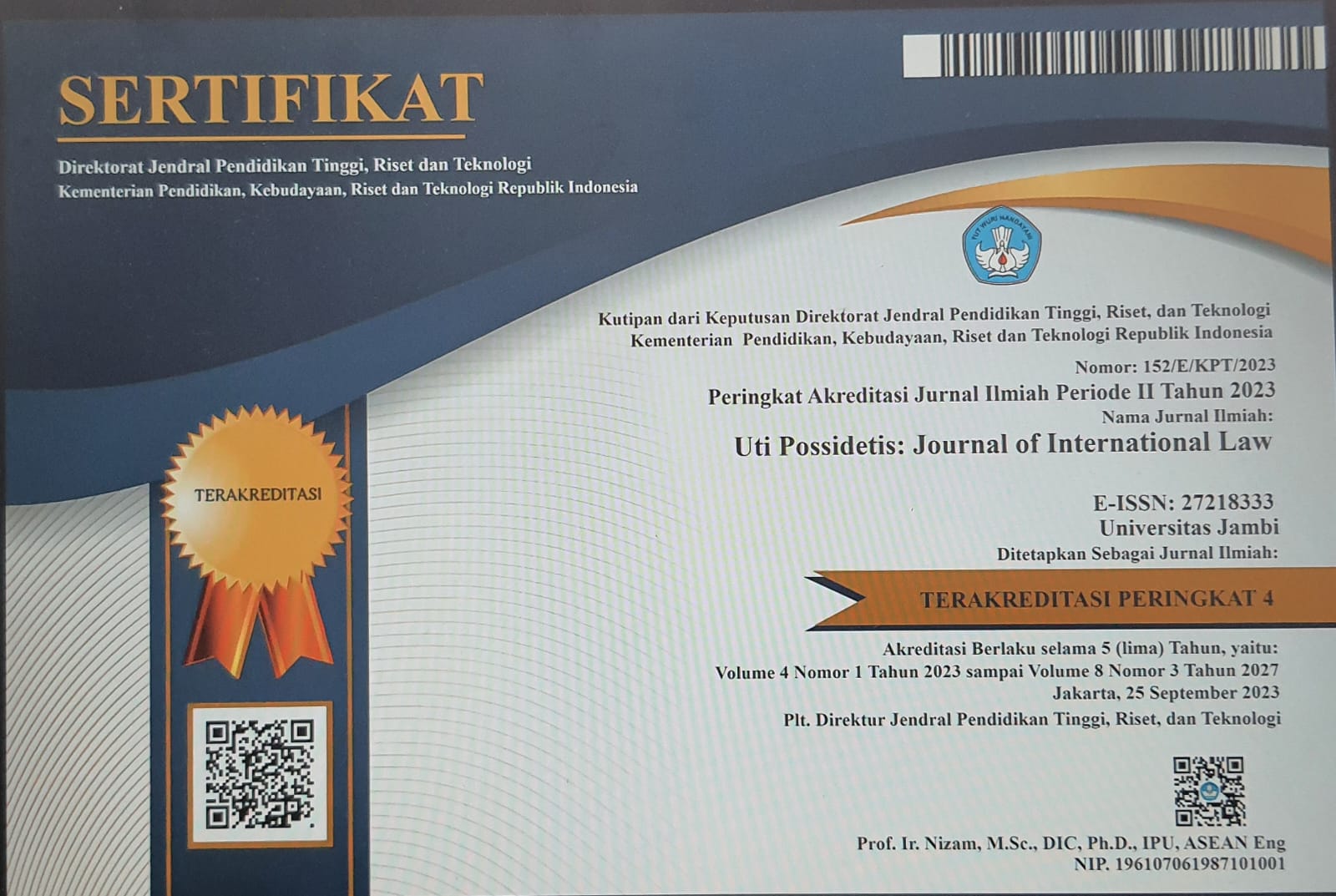Penerapan Prinsip Self Determination terhadap Pembentukan Negara Kosovo Ditinjau dari Perspektif Hukum Internasional
DOI:
https://doi.org/10.22437/up.v1i2.9867Keywords:
International Law, Kosovo, StateAbstract
The state is a continuation of the human desire to interact with each other to complete all the necessities of life. The wider the interpersonal relationship, the greater the need, the greater the need for a state that protects and sustains his life. On February 17, 2008, the Kosovo parliament proclaimed Kosovo an independent state, leaving Serbia at a parliamentary session attended by 109 members. Previously Kosovo was a province under Serbian rule with an ethnic Albanian majority. The purpose of this research is to find out how international law is regulated regarding the formation of a state using the right to self-determination and what is the importance of recognition in the formation of a country. The research method used is a normative juridical research type. The results showed that the right to self-determination has been recognized as a human right in international law. With this right, every country can determine its political status and freely pursue economic, social and cultural development. However, in international law, self-determination is a type of independence that aims to free oneself from colonialism and foreign powers / powers. Regarding the issue of recognition, it is difficult to separate clearly between political and legal elements because the process of granting and refusing recognition by the state is usually influenced by political factors, while the result is legal binding. The definition or elements of the state is contained in the Montevideo Convention 1933, where recognition is a declarative element and if all constitutive elements have been fulfilled by the political community, then automatically it has become a State and must be treated as such by other States.
Downloads
References
Instrumen Hukum
International Covenant on Civil and Political Rights
Declaration on Granting Independence to Colonial Countries and People 1960
Report of the Subcommission on Prevention of Discrimination and Protection of Minorities on its Twenty-sixth Session, E/CN.4/1128.
Kumbaro, Dajena. “The Kosovo Crisis in a International Law Perspective:Self determination, Territorian Integrity and the NATO Interventionâ€. NATO office of International Press. 2001
Buku
Effendi, A. Masyhur.Perkembangan Dimensi Hak Asasi Manusia (HAM) dan Proses Dinamika Penyusunan Hukum Hak Asasi Manusia (HAKHAM). Bogor: GHALIA Indonesia. 2005.
Sujatmoko, Andrey.Hukum HAM dan Hukum Humaniter.Jakarta: Rajagrafindo Persada. 2015.
Shaw, Malcolm N. Hukum Internasional. Bandung: Nusa Media. 2013.
Sefriani.Peran Hukum Internasional Dalam Hubungan Internasional Kontemporer. Jakarta:Rajawali Pers. 2016.
Sefriani.Hukum Internasional Suatu Pengantar.Jakarta: Rajawali Pers. 2010.
Soekanto, Soerjono dan Sri Mamudji.Penelitian Hukum Normatif Suatu Tinjauan Singkat. Jakarta: CV. Rajawali. Cetakan Pertama. 1985.
Marzuki, Peter Mahmud.Penelitian Hukum. Jakarta: Kencana Prenada Media Grup. 2005.
Brierly.J.L.The Law Nations. Clarendon Press. Oxford. 1955.
Ramlan.Hukum Internasional.Universitas Jambi.Jambi. 2005.
Thontowi, Jawahir dan Pranoto Iskandar.Hukum Internasional Kontemporer. Bandung: PT. Refika Aditama. 2006.
Mauna, Boer. Hukum Internasional: Pengertian Peranan dan Fungsi Dalam Era Dinamika Global. Bandung: P.T. Alumni. 2003.
Artikel/Jurnal
Idris, WTO : Perspective of Sustainable Development and Ecolabelling. Jurnal Hukum Internasional Universitas Padjadjaran Bandung, Vol 1, No. 3.Desember 2002.
Kusniati, Retno. Sejarah Perlindungan Hak Hak Asasi Manusia dalam Kaitannya dengan Konsepsi Negara Hukum. INOVATIF| Jurnal Ilmu Hukum 4.5 (2011).
Downloads
Published
How to Cite
Issue
Section
License
Copyright (c) 2020 Yogi Dwi Saputra, Ramlan Ramlan

This work is licensed under a Creative Commons Attribution 4.0 International License.







